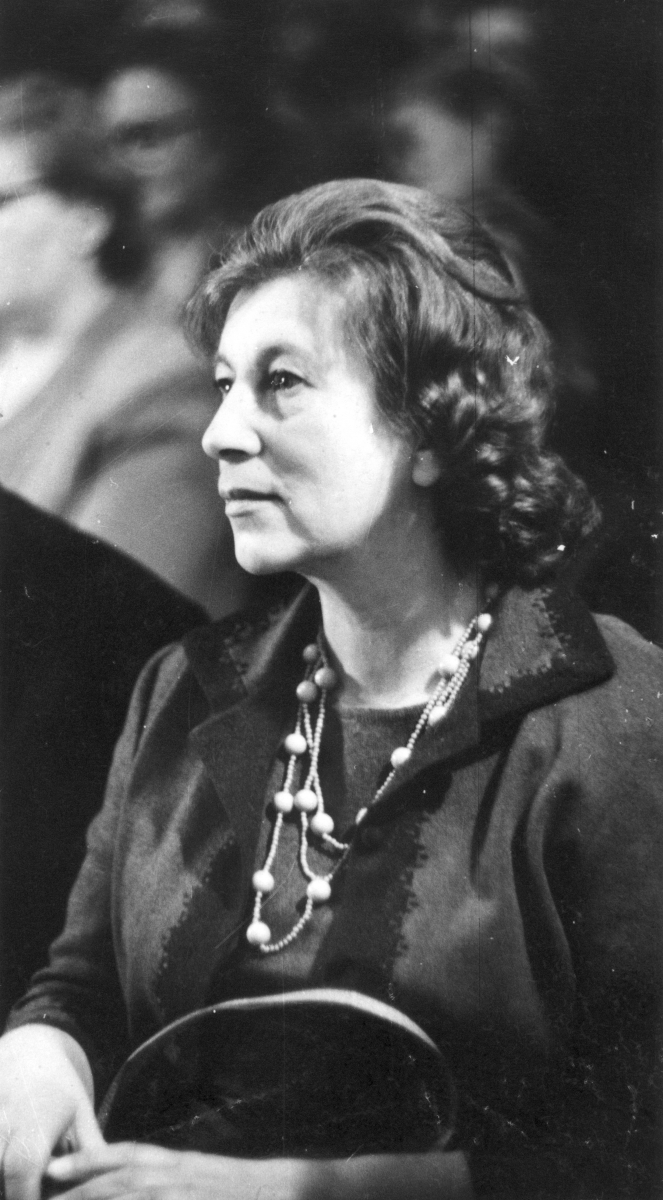
Kersti Merilaas
Kersti Merilaas (7. XII 1913 – 8. III 1986; known until 1935 as Eugenie Moorberg) was an Estonian poet and one of the most outstanding young authors to debut in independent Estonia in the 1930s. Her creative path was stalled by the politically complicated conditions of Soviet occupation. She was born in Narva, lived some years in St. Petersburg, and then came to Northern Estonia in 1917, where she lived in several different locations near Väike-Maarja. She attended Kiltsi primary school and high schools in Väike-Maarja, Rakvere, and Tapa, eventually completing her education at Tapa High School in 1934. She then earned her way with various casual jobs and was an official in Rakvere County government from 1935-1936. In 1936, she married the poet August Sang and lived for some time as a professional writer in Tartu. From 1944, she lived in Pärnu and from 1970 in Tallinn, sometimes as well near Elva in Peedu. She died in Tallinn.
She began writing verse already in Kiltsi primary school; her first poems were published in the 1927 edition of the youth journal Elukevad. When entering Tartu, Merilaas joined a group of young poets, known as Arbujad (‘Soothsayers’), and from 1935-1938, published 60 poems in journals, primarily in the prestigious Estonian Writers’ Union journal Looming. Her collection Maantee tuuled (‘Highway Winds’, 1938) was well received by both readers and reviewers. It contained sincere and positive love and nature poems, whose artistic accuracy and traditional verse techniques represented the characteristic neo-classical poetics of the Arbujad poets, but Merilaas’ poems were relatively simpler in form, more spontaneous, and sounded more song-like.
Merilaas’ next poetry collection for adults was not published for another 24 years. In so far as Soviet censorship enabled her, her poems appeared in periodicals. Generally, she wrote and published mostly children’s poetry in the 1940s, which was a nice exception in an environment of scarce and monotonous children’s literature. She also published poetry collections for children later on. In the beginning of the 1950s, Merilaas’ poetry was banned from publication, but the ban was eventually lifted by the so-called Khrushchev Thaw. In the 1960s, her collections Rannapääsuke (‘Beach Swallow’, 1962) and Kevadised koplid (‘Spring Paddocks’, 1966), as well as the select collection Kuukressid (‘Moonlight Cresses’, 1969), were published. As in her previous work, the lyrical sensations and vivid perceptions of nature stood out, yet these collections also held a relatively weightier role in poetic, social, and aesthetic discourse. The poems are inspired by the influential symbolism of home and homeland, such as, for example, the well-known Põhjarannik (‘North Coast’) and Rukkilill (‘Cornflower’). Merilaas was one of the first Estonian poets to be aware of environmental problems and global threats.
A special position in the work of Merilaas and in Estonian poetry in general is held by her last collection Antud ja võetud (‘Given and Taken’, 1981). This collection provides a retrospective view of life already gone by and contemplations. Themes of love and death are developed originally and poetically. Grief because of the loss of a loved one, moods of aging and loneliness are interwoven with beautiful memories, bringing with it nostalgia, but finally, an ultimate reconciliation. The poems have a predominantly free rhythm, as did many of her 1960s poems, but in this final collection, their expression is especially laconic and precise.
The themes of aging and looking back on life is also central to Merilaas’ play Kaks viimast rida (‘The Two Last Rows’, 1973). She also wrote the children’s play Pilli-Tiidu (1977) and several opera librettos. Additionally, Merilaas published short stories in periodicals and translated B. Brecht, J.W. Goethe, and others from German.
E. S. (Translated by M. M.)
Books in Estonian
Poems
Maantee tuuled. Luuletusi. Tartu: Eesti Kirjanikkude Liit, 1938, 62 lk.
Kallis kodu. Tartu: Tartu Eesti Kirjastus, 1944, 70 lk. [Luuletusi lastele.]
Päikese paistel. Tallinn: Ilukirjandus ja Kunst, 1948, 84 lk. [Luuletusi lastele.]
Veskilaul. Värssjutustus [lastele]. Tallinn: Eesti Riiklik Kirjastus, 1959, 14 lk.
Rannapääsuke. Luuletusi 1938–1958. Tallinn: Eesti Riiklik Kirjastus, 1962, 132 lk.
Lugu mustast ja valgest. Tallinn: Eesti Riiklik Kirjastus, 1962, 17 lk. [Värssjutustus lastele.]
Kevadised koplid. Tallinn: Eesti Raamat, 1966, 88 lk.
Kuukressid. Tallinn: Eesti Raamat, 1969, 196 lk.
Poeem Pärnu silgust. Tallinn: Eesti Raamat, 1973, 46 lk.
Antud ja võetud. Luuletusi 1977–1979. Tallinn: Eesti Raamat, 1981, 80 lk.
Lumest lumeni. Luuletusi lastele. Tallinn: Eesti Raamat, 1982, 44 lk.
Kui vanaema noor oli. Värsse lastele. Tallinn: Eesti Raamat, 1983, 80 lk.
Valitud teosed. 1. ja 2. köide. Tallinn: Eesti Raamat, 1986, 282 + 335 lk.
Kersti Merilaas. Koostanud Joel Sang. Tallinn: Eesti Raamat, 1993, 127 lk. [Sari ‘Väike luuleraamat’.]
Valitud luuletused. Valinud Viivi Luik. Tallinn: Vagabund, 2003, 233 lk.
Plays
Kaks viimast rida. Näidend neljas pildis. Tallinn: Perioodika, 1973, 68 lk.
Pilli-Tiidu. Tallinn: Eesti Raamat, 1977, 120 lk.
Valitud teosed. 1. ja 2. köide. Tallinn: Eesti Raamat, 1986, 282 + 335 lk.
About Kersti Merilaas
Sirje Kiin, Kersti Merilaas: luuletaja elu. Tallinn: Eesti Raamat, 1989, 268 lk.



